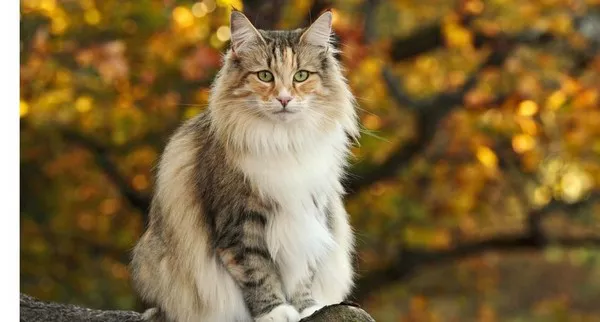Norwegian Forest Cats (NFCs) are a unique and captivating breed, known for their striking appearance, tufted ears, and luxurious, semi-long fur. As one of the oldest domestic cat breeds, with a history dating back centuries, these majestic felines have adapted to harsh Nordic climates and developed a robust nature. However, like all living beings, Norwegian Forest Cats are not immune to health issues. In this comprehensive article, we will explore the health considerations associated with this breed, delving into their genetics, common ailments, preventive care, and the role of responsible breeding practices.
Genetic Predispositions:
Understanding the genetic predispositions of Norwegian Forest Cats is crucial for identifying potential health issues. NFCs are generally considered a healthy breed, but they do have some genetic conditions that may be inherited. Hypertrophic Cardiomyopathy (HCM), a heart condition that leads to the thickening of the heart muscle, is a concern in some pedigrees. Regular veterinary check-ups, including heart screenings, can help detect and manage this condition.
Another genetic concern is Glycogen Storage Disease IV (GSD IV), a rare metabolic disorder that affects the body’s ability to store and release glycogen. Responsible breeders perform genetic testing to minimize the risk of passing on these hereditary conditions to offspring. It is essential for prospective NFC owners to choose reputable breeders who prioritize the health and well-being of their breeding cats.
Common Health Issues:
While Norwegian Forest Cats are generally hardy, they can still be prone to certain health issues common to all cats. Dental problems, such as gingivitis and periodontal disease, are not exclusive to NFCs but can impact their overall well-being. Regular dental care, including brushing their teeth and providing dental treats, can help prevent these issues.
Obesity is another concern, especially for indoor NFCs with less opportunity for natural exercise. Maintaining a healthy diet and encouraging physical activity through interactive toys and playtime are essential to prevent obesity-related health problems. As with any cat breed, urinary tract issues, such as crystals or blockages, may also arise. Adequate hydration, a balanced diet, and regular veterinary check-ups can contribute to urinary tract health.
Coat and Grooming Considerations:
The Norwegian Forest Cat‘s luxurious double coat, consisting of a dense undercoat and longer guard hairs, requires regular grooming to prevent matting and reduce shedding. While their coat serves as insulation in colder climates, it can pose challenges in warmer environments. Overheating is a potential issue, so providing a cool and comfortable living environment is crucial.
See Also:Optimal Diet for Norwegian Forest Cats: A Comprehensive Guide
Regular grooming sessions not only maintain the beauty of their coat but also allow owners to check for skin issues, parasites, or abnormalities. Skin conditions, such as dermatitis or fungal infections, may occur, emphasizing the importance of vigilant grooming practices and prompt veterinary attention if any issues are detected.
Preventive Care:
Preventive care plays a pivotal role in keeping Norwegian Forest Cats healthy and happy. Vaccinations, flea and parasite control, and regular veterinary check-ups are essential components of preventive care. NFC owners should work closely with their veterinarians to establish a tailored wellness plan, taking into account the individual cat’s age, lifestyle, and potential risk factors.
Nutrition is a cornerstone of preventive care. Providing a balanced and species-appropriate diet is crucial for the overall well-being of NFCs. Owners should be mindful of their cat’s dietary needs, ensuring they receive the appropriate nutrients for their age, activity level, and health status. Consulting with a veterinarian can help formulate a nutrition plan tailored to the specific needs of Norwegian Forest Cats.
The Role of Responsible Breeding:
Responsible breeding practices are instrumental in maintaining the health and vitality of Norwegian Forest Cats. Ethical breeders prioritize the overall well-being of their breeding cats and kittens, conducting thorough health screenings and genetic testing. They adhere to established breeding standards, avoiding the propagation of hereditary conditions and promoting genetic diversity within the breed.
Prospective NFC owners should research and select breeders with a proven track record of responsible breeding. Reputable breeders prioritize the physical and emotional health of their cats, engage in proper socialization practices, and provide a supportive environment for kittens during their crucial developmental stages.
Conclusion:
Norwegian Forest Cats are a captivating and robust breed that brings joy to many households around the world. While they generally enjoy good health, it is essential for owners to be aware of potential genetic predispositions, common health issues, and the significance of preventive care. Through responsible breeding practices, regular veterinary check-ups, and attentive care, NFC owners can ensure their feline companions live long, healthy, and happy lives.
In the grand tapestry of feline diversity, Norwegian Forest Cats stand out not only for their stunning appearance but also for their resilience. By staying informed and actively participating in the well-being of these majestic cats, owners can forge lasting bonds with their NFCs, creating a harmonious and healthy life together.
Related Topics:
How Smart Are Norwegian Forest Cats?
Why Did Norwegian Forest Cats Almost Go Extinct?
What Are Norwegian Forest Cats Descended From?



























